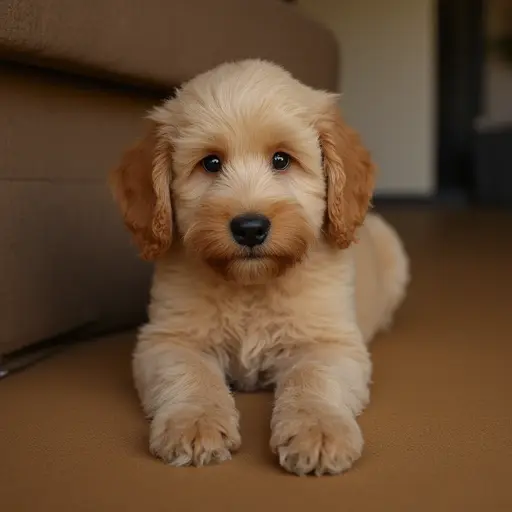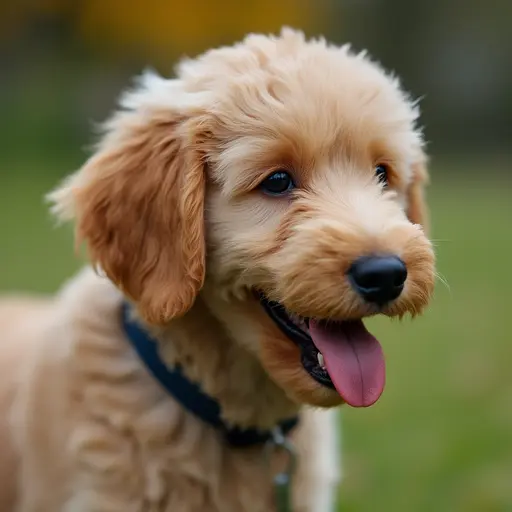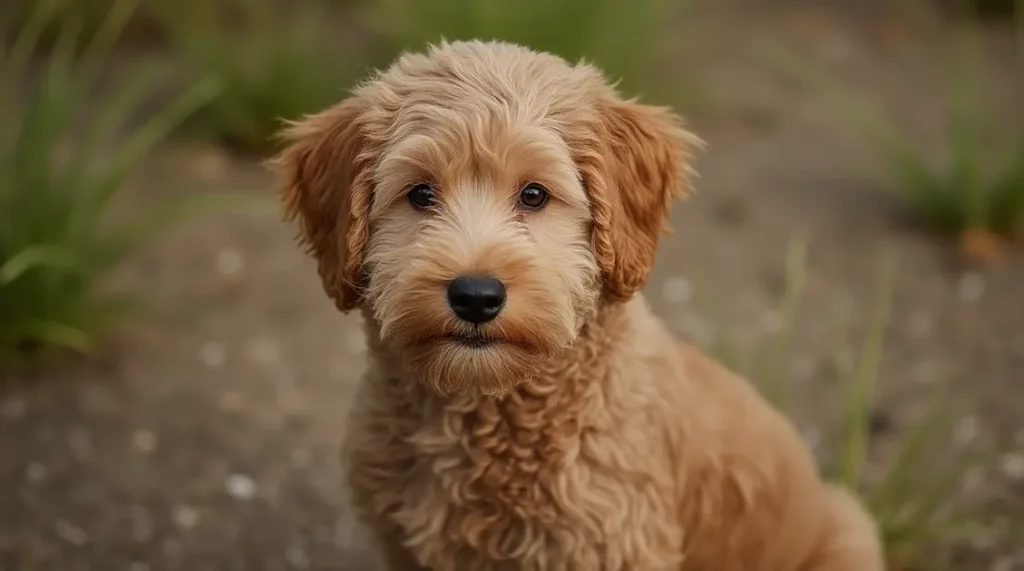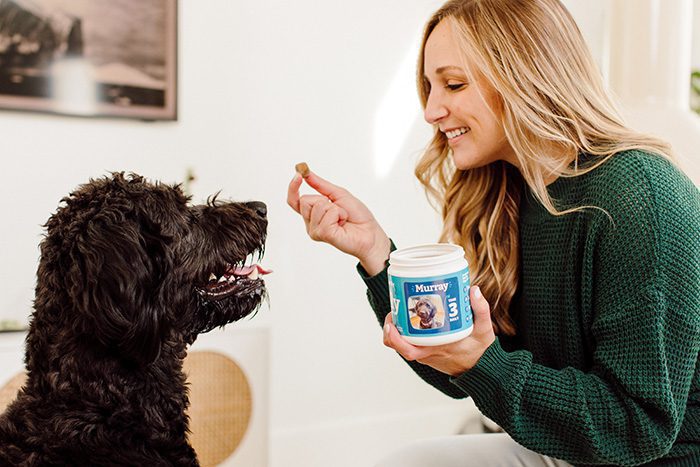Mini Goldendoodles are adorable, smaller versions of Goldendoodles, typically 13-20 inches tall and weighing 15-35 pounds.
They’re known for their friendly, loyal temperament, making them great for first-time pet owners and families with kids.
Their coats come in various colors, including unexpected shades like apricot and merle, and they shed minimally, which is ideal for allergy sufferers.
These dogs thrive on social interaction and can struggle with separation anxiety if left alone for more than 8 hours, so daily attention is key.
Feed them 1-4 cups of high-quality dry food daily, divided into two meals, and watch for health issues like hip dysplasia. Regular vet check-ups and choosing a reputable breeder can help manage potential genetic conditions.
The History of Mini Goldendoodles
Mini Goldendoodles first appeared in the mid-1990s, driven by the desire to create a dog with the gentle nature of the Golden Retriever and the hypoallergenic coat of the Poodle.
Poodles, originating in Germany, were historically used for hunting and retrieving before gaining popularity in France, where they were bred in different sizes, including the Miniature Poodle.
Golden Retrievers, on the other hand, were developed in 19th-century Scotland by Lord Tweedmouth, who aimed to breed a dog skilled in hunting and retrieving but also devoted and attentive.
The Mini Goldendoodle, inheriting traits from both these distinguished breeds, has become a beloved family pet, cherished for its intelligence, trainability, and loving personality.
The Appeal of Mini Goldendoodles: Why They’re So Popular
Mini Goldendoodles are incredibly popular for several reasons. Their smaller size makes them suitable for a variety of living spaces, including apartments.
They are known for their hypoallergenic qualities, often inheriting the low-shedding coat of the Poodle, which makes them a great option for people with allergies.
Their gentle and playful temperament makes them fantastic family pets, especially for households with children.
Mini Goldendoodle Appearance and Size:
Mini Goldendoodles are known for their adorable teddy bear appearance, but their looks can vary, adding to their charm.
Coat Types and Colors: From Fluffy to Curly, Golden to Chocolate
One of the appealing aspects of Mini Goldendoodles is the variety in their appearance. They inherit a mix of traits from their Golden Retriever and Poodle parents, resulting in a range of coat types and colors. You’ll find Mini Goldendoodles with coats that are:
- Curly: Taking after the Poodle parent, these Mini Goldendoodles have tight curls that are soft and bouncy.
- Wavy: A balanced blend of both parents, resulting in a coat with soft, gentle waves.
- Straight: More like the Golden Retriever, these Mini Goldendoodles have a smooth, straight coat.
Mini Goldendoodles also come in a variety of colors, including:
- Golden: The classic golden hue, ranging from light to rich, deep gold.
- Cream: A soft, pale shade of gold, almost white.
- Red: A warm, reddish-brown color, similar to some Golden Retrievers.
- Chocolate: A deep, rich brown color, sometimes seen in Poodles.
- Black: A striking black coat, often seen in Poodles.
The color and coat type of a Mini Goldendoodle puppy are not always predictable as it depends on the combination of genes they inherit from their parents.
Understanding “Mini” vs. Standard Goldendoodles
While the term “mini” suggests a small size, it’s important to understand the size range for this breed. Mini Goldendoodles are smaller than standard Goldendoodles but can still have some variation.
- Mini Goldendoodle: Typically weighs between 15 to 35 pounds and stands 13 to 20 inches tall at the shoulder.
- Standard Goldendoodle: Can weigh 40 pounds or more and stand over 20 inches tall at the shoulder.
A Mini Goldendoodle’s adult size can be influenced by the size of its parents and the specific breeding lines. Reputable breeders can usually provide a good estimate of a puppy’s expected adult size based on their lineage.

Miniature Goldendoodle Temperament and Personality:
Mini Goldendoodles are known for their incredible temperaments, making them highly desirable as family pets.
Gentle, Loving, and Playful: The Ideal Family Dog
Mini Goldendoodles are renowned for their gentle, loving, and playful nature. They are known for being incredibly affectionate with their family members and love to cuddle.
They have a playful energy that makes them great companions for children. Their happy and eager-to-please disposition makes them a joy to be around.
Intelligence and Trainability: Eager to Please and Quick Learners
Inheriting intelligence from both Poodle and Golden Retriever lineages, Mini Goldendoodles are quick learners. Their eagerness to please makes them highly trainable.
They respond well to positive reinforcement training methods, making the process enjoyable for both the dog and the owner.
Their intelligence also means they can learn a variety of commands and tricks, making them versatile companions.
Activity Levels and Exercise Needs
Mini Goldendoodles have moderate energy levels and require daily exercise to stay happy and healthy. They enjoy walks, playtime in the yard, and interactive games like fetch.
While they’re adaptable to apartment living, they thrive with regular opportunities to run and play.
Mini Goldendoodle Care Guide:
Owning a Mini Goldendoodle, like any pet, comes with responsibilities to ensure their well-being. Here’s a basic care guide:
Grooming Essentials
Mini Goldendoodles require regular grooming to keep their coats healthy and free of mats. The frequency of brushing depends on their coat type.
Curly or wavy coats may need daily brushing to prevent tangling, while straight coats can be brushed a few times a week.
Regular professional grooming is also recommended to maintain their coat’s health and appearance.
Dietary Needs
A balanced diet is crucial for your Mini Goldendoodle’s health and energy levels. High-quality dog food, whether kibble, wet food, or a combination, should provide essential nutrients.
The amount of food will depend on their age, size, and activity level. Consult with your veterinarian to determine the best diet for your furry friend.
Exercise Requirements: Meeting Their Energy Needs
Daily exercise is a must for Mini Goldendoodles. Aim for at least 30 minutes of activity each day, which can be split into walks, playtime, or interactive games.
Regular exercise helps them stay physically fit, and mentally stimulated and prevents boredom.
Are Mini Goldendoodles Hypoallergenic?
One of the most common questions about Mini Goldendoodles is whether they are truly hypoallergenic.
Shedding and Allergies: Understanding the Facts
While no dog breed is 100% hypoallergenic, Mini Goldendoodles are considered low-shedding, making them a better choice for people with allergies.
They inherit the low-shedding qualities of the Poodle, which produces hair rather than fur. This means they shed significantly less than many other breeds.
Furnishings and the Non-Shedding Gene
The degree of shedding in a Mini Goldendoodle can vary, and it’s not solely determined by coat type. The presence of “furnishings” – the longer hair around the face – is often associated with a lower shedding rate.
Multigenerational Mini Goldendoodles bred for non-shedding qualities typically have two copies of the furnishing gene, which further reduces shedding.

Training Your Mini Goldendoodle:
Mini Goldendoodles are intelligent and eager to learn, making them a joy to train.
Early Socialization and Bonding: Tips for Success
Early socialization is critical for a well-adjusted Mini Goldendoodle. Expose your puppy to a variety of people, dogs, and environments from a young age.
Positive interactions help them develop confidence and good manners.
Crate Training: A Must for Housebreaking and Safety
Crate training is highly beneficial for Mini Goldendoodles. It provides a safe space and aids in housebreaking.
A crate can also prevent destructive behavior when you’re not home. Introduce the crate gradually and make it a positive experience with treats and praise.
Basic Obedience Training
Basic obedience training is essential for all dogs, including Mini Goldendoodles. Teaching commands like “sit”, “stay”, “come”, and “leave it” lays the foundation for a well-behaved companion.
Enroll in a puppy training class or work with a certified dog trainer for guidance.
Advanced Training Options: Therapy Dog Potential and More
Mini Goldendoodles’ gentle nature and trainability make them suitable for advanced training, such as therapy dog work.
Their intelligence and willingness to learn make them adaptable to various roles, including emotional support or even some service dog tasks.
Finding a Reputable Mini Goldendoodle Breeder:
Choosing a reputable breeder is crucial when getting a Mini Goldendoodle. This ensures you’re getting a healthy, well-adjusted puppy.
Signs of a Responsible Breeder
- Health Guarantees: Reputable breeders offer health guarantees, covering genetic conditions.
- Parent Dog Health Testing: They should provide documentation of health testing for parent dogs, including evaluations for common genetic issues.
- Clean and Caring Environment: The breeding facility should be clean, and puppies should be well-cared for.
- Socialization and Early Training: Reputable breeders will begin socializing puppies at a young age.
- Transparency and Open Communication: They will answer your questions honestly and provide information about their breeding practices.
Key Questions to Ask a Breeder
When choosing a breeder, ask about:
- Health testing is done on parent dogs.
- Socialization and early training are provided to puppies.
- Their breeding philosophy and goals.
- The availability of references from previous puppy buyers.
Understanding Generations: F1, F1B, and Multigenerational Mini Goldendoodles
Mini Goldendoodles come in different generations, which refer to their parentage:
- F1: First-generation, a direct cross between a Golden Retriever and a Miniature Poodle.
- F1B: Backcrossed to a Poodle, meaning one parent is an F1 Goldendoodle, and the other is a Poodle.
- Multigenerational: Several generations of Mini Goldendoodles bred together.
Each generation has slight variations in coat type, shedding, and other characteristics. Discuss your preferences with the breeder to determine which generation best suits your needs.
Mini Goldendoodle Health Considerations:
While Mini Goldendoodles are generally healthy dogs, they can be prone to certain health conditions, like all breeds.
Common Health Concerns: Hip Dysplasia, Eye Issues, and More
Some health concerns to be aware of in Mini Goldendoodles include:
- Hip Dysplasia: A common joint condition affecting the hip joint.
- Patellar Luxation: A condition where the kneecap dislocates.
- Progressive Retinal Atrophy: A degenerative eye disease that can lead to blindness.
Preventative Care
Preventative care is crucial for maintaining your Mini Goldendoodle’s health:
- Regular Vet Check-ups: Annual or bi-annual visits are essential for the early detection of health issues.
- Vaccinations: Keep your Mini Goldendoodle up-to-date on vaccinations to protect against preventable diseases.
- Dental Hygiene: Regular brushing and professional dental cleanings are important for oral health.
Lifespan: How Long Do Mini Goldendoodles Live?
Mini Goldendoodles have an average lifespan of 10 to 15 years. Providing a healthy diet, regular exercise, and preventative care can help them live a long and fulfilling life.
Is a Mini Goldendoodle Right for You?
Mini Goldendoodles are wonderful dogs, but it’s essential to assess if their needs align with your lifestyle.
Pros and Cons: A Realistic Assessment
Pros:
- Gentle and loving temperament: Making them ideal family pets.
- Hypoallergenic qualities: Great for people with allergies.
- Intelligent and trainable: Easy to train and eager to please.
- Adaptable to various living situations: Suitable for apartments and homes with yards.
Cons:
- Can be prone to separation anxiety: Requires attention and companionship.
- Needs regular grooming: Their coats require frequent brushing and professional care.
- Moderate exercise needs: Needs daily walks, playtime, and mental stimulation.
Lifestyle Compatibility: Matching Your Energy and Space
Before getting a Mini Goldendoodle, consider:
- Your activity level: Can you provide them with enough exercise and mental stimulation?
- Your living space: Do you have enough room for them to play and be comfortable?
- Your time commitment: Are you prepared to dedicate time to training, grooming, and socialization?
Mini Goldendoodle Rescue and Adoption
If you prefer to give a dog a second chance, rescuing a Mini Goldendoodle is a wonderful option.
Finding a Rescue Organization
There are numerous breed-specific rescue organizations dedicated to finding loving homes for Mini Goldendoodles. You can also check local animal shelters and rescue groups.
The Adoption Process: What to Expect
The adoption process typically involves:
- An application: Providing information about your lifestyle and home environment.
- A home visit: The rescue organization may conduct a home visit to ensure a suitable living space.
- A meet and greet: You’ll have the opportunity to meet the dogs and interact with them.
- An adoption fee: To cover the cost of care and vetting.
The Joy of Owning a Mini Goldendoodle:
Owning a Mini Goldendoodle can bring immense joy and companionship into your life.
Practical Tips for Owners
For potential owners, Mini Goldendoodles are ideal for busy households that can provide constant interaction, given their social nature and separation anxiety concerns.
Training should start early, using positive reinforcement, and socialization is key to maintaining their friendliness with strangers and other pets.
Owners should monitor for health red flags, like signs of hip dysplasia, and ensure a balanced diet and regular exercise to prevent obesity and related issues.
Living with a Mini Goldendoodle, their high energy and affection make them rewarding companions, but their grooming needs mean owners must be prepared for regular maintenance.
They are adaptable to both rural and urban settings, fitting well in apartments if exercise needs are met, and their hypoallergenic coat is a bonus for allergy sufferers.
Detailed Comparison Table
Below is a table summarizing key characteristics and care needs for easy reference:
| Aspect | Details |
|---|---|
| Height/Weight | 13-20 inches, 15-35 pounds, reach adult weight by 8 months |
| Lifespan | 10-15 years, influenced by exercise, nutrition, hygiene |
| Coat Colors | Black, white, silver, brown, blue, red, parti, sable, cream, tan, apricot, merle |
| Temperament | Loving, loyal, highly social, easy to train, high energy, family-friendly |
| Exercise Needs | At least 30 minutes daily, walks, playtime, swimming, avoid 1-2 hours before/after eating |
| Grooming | Brush daily if long, a few times weekly if short, and groom every 4-8 weeks. Daily teeth brushing |
| Diet | 1-4 cups high-quality dry food daily, divided, AAFCO-compliant, watch for bloat |
| Health Issues | Hip dysplasia, von Willebrand’s, cancer, allergies, dental issues, ear infections, GDV |
| Social Needs | Prone to separation anxiety, don’t leave alone over 8 hours, need daily interaction |
A Loving Companion for Years to Come
Mini Goldendoodles are known for their unwavering loyalty and affectionate nature. They’re always eager to greet you with wagging tails and show you love. They thrive on human interaction and become an integral part of the family.
Creating a Lifelong Bond with Your Mini Goldendoodle
The bond you build with your mini goldendoodle can be incredibly special. From puppyhood to senior years, they’ll be by your side, bringing you unconditional love, laughter, and countless happy memories.
Mini Goldendoodles are a wonderful choice for those seeking a loving, intelligent, and adaptable companion. By understanding their needs and committing to their care, you can welcome a furry friend who will enrich your life for years.



